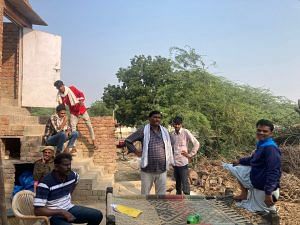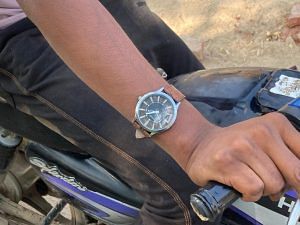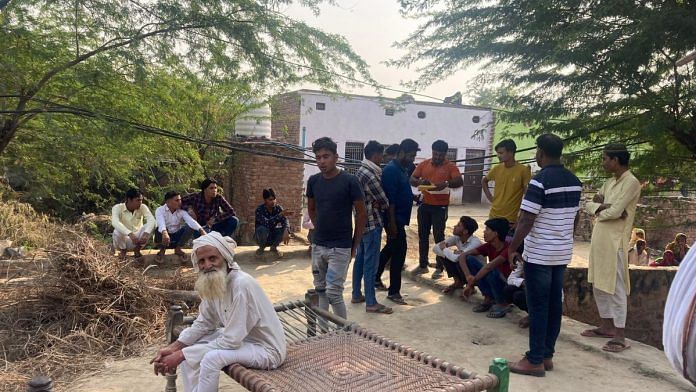A tense charpai meeting is underway in the Parehi village of Mewat, India’s new cyber scamming hub. Policemen from Rajasthan and Kerala have descended, the rural menfolk are all aflutter, and two hours of finger-pointing and heated arguments have exhausted everyone. But the villager accused of scamming a Malayali vegetable seller of Rs 32,798 is nowhere to be found.
Parehi is still protecting him.
Just the previous day, police had picked up his location — barely 100 metres from where the team stood now. But the villagers in Mewat swear they haven’t seen him for two months.
Spread over three states—Haryana, Rajasthan and Uttar Pradesh—Mewat is India’s new Jamtara, the cyber scamming ground zero of the past decade, made notoriously immortal by the Netflix series. Now, there are newer satellite towns and villages that are spreading across India mounting countless scams on hapless cell phone owners. And each one is newer and bolder than Jamtara. Mewat’s scam is more diffused, falling under three states’ jurisdictions, and the crimes have gotten more devious and less sophisticated, landing somewhere at the bottom of the totem pole of scams. Sextortion is the new kill.
The problem is hydra-headed. Catching one scammer doesn’t end the problem—10 others pop up.
Even Delhi is taking note. A senior official from the cyber crime unit said a probe has been ordered into Mewat’s gang of young scammers.
From OLX scams — in which people pretend to sell possessions on the online marketplace and then either physically lure victims to pick-up locations or scam them virtually — to sextortion, Mewat has become the focal point of cybercrime in North India. And it’s not just unlucky men who fall for these crimes. From Bharatiya Janata Party (BJP) MP Pragya Thakur to a Shiv Sena MLA, no one is spared.
Unlike Kolkata’s burgeoning phishing industry, which has office buildings and call centres, the Mewat scam is a bit of an unstructured cottage industry. Scammers are travelling a lot, especially because many are also truck drivers. They make suspicious phone calls from non-descript highways, using sim cards collected from the road. This is predominantly a leaderless crime racket. There are no kingpins. Anyone with a smartphone and a sim can scam and blackmail.
“They dry up their trail of crimes with fake IDs,” says O.P. Singh, Additional DGP, State Crime Branch, Haryana Police. Their ever-changing, dynamic modus operandi doesn’t make things any easier. “Our police investigators need to upskill.”

Also read: Fake customer care numbers, OTP access — how a gang in Jamtara cheated over 1,000 people
Sextortion is the new kill
For 28-year-old Deepak, alarm bells began to ring as soon as Truecaller identified the number as that of ‘Delhi Police Crime Branch’. He knew something was wrong. When he answered the call, the voice on the other end told him that the police had found an ashleel (obscene) video of him on YouTube, and demanded Rs 20,000 to make it disappear.
Deepak figured it wasn’t the police. He was being blackmailed for money, ever since he answered a video call in April. He saw a naked woman on his screen and immediately disconnected the call. It lasted only four seconds, but the damage had been done. Seconds later, he got another call.
“I think it was a man speaking. I was in shock. They asked me for Rs 5,000, or else they would send a screen recording of this ‘sex chat’ to my friends and family,” said Deepak, who works in Noida. “I told them I didn’t have the money.”
Filled with dread and shame, he scrambled to borrow money from friends. But it was taking time.
The next day, when it was clear he couldn’t pay, a link was sent to all his family members and friends on Facebook — he thinks the scammer pulled his Facebook details from his mobile number. It was enough to force a terrified Deepak offline.
Two days later, he got this call from a number claiming to be Delhi Police. That is when he realised what was happening to him: He was being sextorted.
He quickly blocked the number and went quiet. He was too scared to go to the police and file a complaint.
“I was that victim in that situation,” said Deepak. “But I still felt guilty and ashamed.”
Also read: How gang in 3 Indian states ‘solved’ GMAT, JEE & armed forces exams for cash, with Russian help
A complex modus operandi
The Rajasthan Police were tipped off about Wahid, a 20-year-old truck driver.
When they caught him, they found two phones. One had “sex chats”, followed by screenshots of money transactions. The other contained hundreds of transactions on PhonePe and GooglePay. These sex chats, the police said, included obscene pictures and videos, and one of the chat windows had missed calls.
They went ahead and filed a case against him. The victims they contacted weren’t willing to testify. They were too ashamed, too scared, police said.
“Illiteracy is very high in this region. These are not very sophisticated scams. It’s not like Jamtara. Most scammers go for sextortion,” says Ajay, a police officer from Pahari in Rajasthan’s Bharatpur district. It is one of the three main districts that make up Mewat, besides Nuh in Haryana and Mathura in Uttar Pradesh.
The police say that, unlike phishing, sextortion rackets don’t require reading from a script. A lot of the scams are done in Hindi, and if texting is necessary, they use an app.
Sextortion scammers trap their victims either by luring them through links or video calling, like with Deepak. A few seconds are enough to lay the trap for blackmail — the scammer shows the victim ‘obscene’ imagery or footage, and then frames them for consuming pornography. The first stage, according to the police, is directly blackmailing for money. If the victim blocks their number, the scammer kicks it up a notch and uses another sim card to keep contacting the victim. The third and final stage is to impersonate the police: The scammer pretends to be from the Delhi Police’s cyber crime unit, accuses the victim of watching or distributing pornography, and asks for money to bury the ‘case.’
In Wahid’s case, he was luring his victims via OLX — a combination of the region’s two popular scamming methods. The police found multiple ads that he had posted on OLX to sell vehicles, which he then used as bait to blackmail interested customers.
Wahid was arrested on 17 September and is currently out on bail. His father Ayub swears that his 20-year-old son has nothing to do with such crimes and that he was simply picked up and framed by the police.

“Of course, my husband is scared now, he’s been on the road driving for the last two months. It’s a lie,” says Wahid’s wife, Shehnaz, while holding the youngest of their three children.
Ayub says Wahid was beaten up by the police. “And if we were making that much money, would we be living with such a kitchen and latrine?” Ayub asks, gesturing around his home. Outside, Wahid’s brother is washing his TVS Apache bike, which he bought for the family along with a Mahindra Bolero on two-year-EMIs.
Ayub looks around to make sure no one else is listening and leans in. “But you can see the kitchens and latrines in some other houses,” he whispers, raising his eyebrows suggestively.
Also read: Gold smuggling to cyber-aided financial crimes: How 1991 reforms changed crime in India
Tracking the ‘tatlus’
The scams are called ‘tatlus’ in local Mewati.
Bring up cybercrime in any village in Mewat, and you’re met with cheeky smiles and shrugs. Zakir Khan, 19, a resident of Ikankha, loudly exclaims that he doesn’t even have a mobile phone. Next to him, his friend Ajroo laughs and promises to share Zakir’s phone number later. Mohammed Maneez, another young man in the group, holds up a phone that looks like a Nokia 3310 and swears he doesn’t have WhatsApp. (Spoiler alert: he does have WhatsApp.)
“Everyone here is uneducated. How can they be running scams?” asks Zakir. There’s a loud chorus of agreement.
Ajroo knows too much about IP (Internet Protocol) addresses and VPNs (Virtual Private Networks) to feign complete ignorance. Besides his YouTube shorts, the latest video on the 16-year-old’s YouTube channel is a 30-second clip titled ‘Hot video Saif Ali.”
Mewat is also well aware of its reputation. For example, Gamdi village in Bharatpur is often pinpointed as the epicentre of ‘crime’ in the region. Haryana Police even claim that residents deliberately dig up roads to prevent the police from raiding the village. The last time police officers from Nuh visited Gamdi, their car returned with damages worth Rs 40,000. Police say that thousands of sim cards are supplied by villagers, many of whom are truck drivers who travel all over India.
Gamdi’s residents have another story to tell, a sentiment echoed across Mewat. They say they are targeted because they are Muslims — if they were really making money, through whatever means, would they be living like this?
“It’s because we’re Muslim and we’re poor,” says Kayub Khan, Wahid’s friend and a resident of Ikankha. He’s wearing a bright orange Adidas shirt and a Fossil watch, both of which he says are fake and bought “very cheap” in the nearby town of Kaman.

“When they see us doing well, building houses, buying bikes, they assume we’re doing so through crimes.”
Across state borders, in the village of Nai in Haryana’s Nuh district, brand-new houses complete with fancy gates are hard to miss. A significant portion of the village is under construction, with many families either building new houses or adding levels to existing structures.
Police from Haryana’s Bicchor station, barely five kilometres from Nai, take great pleasure in pointing them out and guessing how many lakhs — or crores, depending on the size — went into each construction.

“Are you really telling me that truck drivers made this much money?” asks a police officer from Bicchor, gesturing at a formidable-looking bungalow with towering colonnades and a garage with a driveway.
“There’s no way they’re making this much, especially after the lockdown. They’re all running tatlus.”
Also read: Yet another spam call? Here’s how they probably got your number & why you should worry
Cat and mouse games
The police in Mewat seem resigned to the reality of cybercrime. They have to chase thousands of fake sim cards, fake phones, fake IDs, and fake profiles. They watch police teams from other states who have tracked criminals down to Mewat with some amusement — they’ve got this far, but only local police know what an uphill battle they have left.
For Rajasthan Police, this is routine. As it is for Haryana and Uttar Pradesh police. Teams from every state in India — including as far away as the Andaman and Nicobar Islands — visit police stations dotting the long border between the three states to catch scammers at large. According to Jayaprakash Singh, SHO of Jurhera police station in Bharatpur, this happens “2-3 times a week”.
Mewat’s police are also trying to stem the flow — both of scammers and of those being scammed. October was “Cyber Crime Awareness” month for the Haryana Police. The entire force was engaged in spreading awareness across the state, giving lectures on cybercrime and how to avoid it.
Sub-Inspector Sudhir, of the cyber crime unit in Nuh, was deputed to deliver a lecture on avoiding cybercrime to BCom students at a local university. He was also working on cracking a sextortion racket operating out of a mobile phone shop in Palwal. A week after the lecture, he arrested a teenager who was working at the shop and would steal data from customers to scam.
It was only when he made the arrest that he realised that the 19-year-old was a BCom student who had attended his lecture the previous week.
Also read: Kolkata is India’s newest, biggest scam zone. Police, YouTubers, mice can’t shut it down
Mewat’s pan-India scams
On a recent pre-winter afternoon, a three-member Kerala Police team travelled 2,000 kilometres — from Parappanangadi to Parehi — to nab their alleged criminal.
The police flashed a photo of the alleged perpetrator, Inzam-ul Haq. Kerala Police say he posed as a military officer and duped the victim, 52-year-old vegetable seller Moiteenkutty. Villagers shrugged and shook their heads. Someone mumbles that they’ve never seen him before. The women in his house take the cue to disperse, disappearing indoors while men sweep the police to a negotiation spot.
“How much was scammed?” demands Javed, Inzam’s elder brother. “Rs 40,000? I’ll give that now in cash. Will the case be closed then?”
The officers exchange looks, and a volley of Malayalam follows. The rest look at them expectantly. Finally, a police officer says Javed can transfer the money directly to the victim, after which it’s the victim’s prerogative to drop charges.
Moiteen filed the case on 30 May 2022. It took the Kerala Police five months to track Inzam down to the district of Bharatpur. By the time they arrived to arrest him, he was long gone — or so the villagers say.
Police suspect that Javed himself conducted the scam using his brother’s number. But there’s no way to confirm this, unless one of them accidentally leaves a trail. And there lies the problem — compounded by the fact that the villagers are all hyper-aware of the police.
Also read: India is the sixth most data-breached country in world, says study by cybersecurity firm
The Meos of Mewat
Mewat is home to Meo Muslims, one of the poorest, as well as largest, Muslim communities in the subcontinent. Nuh, the district in Haryana that used to be called Mewat, is the most ‘backward district’ in India, according to the Niti Aayog. The entire region is stereotyped as a criminal belt and is often hatefully called ‘mini Pakistan’.
Even the Kerala Police is conscious of Mewat’s demographics: Their three-member team was made up of one Muslim, one Hindu, and one Christian so that any religious tensions could be worked through.
“The entire Meo tribe was stigmatised as a “criminal tribe”,” writes academic Shail Mayaram in her book Against History, Against State: Counterperspectives from the Margins. “The Meos demonstrate what [psychologist Erik] Erikson calls a negative identity: What is stigmatised becomes a matter of glorification. Looting and banditry become a consciously heroic act,” she writes.
What makes matters complicated is that Mewat straddles three state borders.
“The issue has more to do with border territories than with regional demographics,” said Manish Meena, Chief Development Officer of Mathura, Uttar Pradesh. Mathura is also the third major district that makes up Mewat. “Being close to Gurgaon and Delhi also encourages this network of criminal elements to take advantage of the tri-junction. How to cross state borders, how to transfer cash to different accounts, how to evade state authorities — all this is easier to do in a border region,” he added.
Also read: ‘How to save Hindus’ – On phones of Jahangirpuri teens tips to keep acid, knife, glass
Sparing nobody
This Diwali was difficult for Nikita Jain Doshi’s father, Rakesh Jain.
He received two video calls from an unknown number. One was 7 seconds long, and the next was 3 seconds long. But it was enough for the scammer to record Jain watching something — and then use it to blackmail the 65-year-old for money.
He wasn’t as strong as Deepak.
Jain transferred Rs 10,000, but the blackmail continued. On 10 November, he left his phone at his workplace and disappeared.
It was only when his family opened his call logs that they realised he was being blackmailed.
“The criminals are just using technology as a tool,” says Doshi. “They are really just playing with your mind.” Her father used a dual sim phone and disabled one of the sims out of fear. When she and her brother switched it back on, they received a call from the alleged scammer, who in turn asked them for money. Her brother told them he knew it was a scam: The phone line was immediately disconnected, and the number became unreachable. They’d already registered a missing person’s complaint with the police: now they knew he was also being sextorted.
A week-long search ensued. Finally, at 4:30 am on 18 November, Doshi’s doorbell rang. It was her father. He had spent the last seven days praying at a temple in Kishangarh in Rajasthan, hoping to find fortitude.
As she rushed to open the gate and hug him, Jain said only one thing before collapsing into tears. “Beta, I’m sorry.”
(Edited by Zoya Bhatti)



